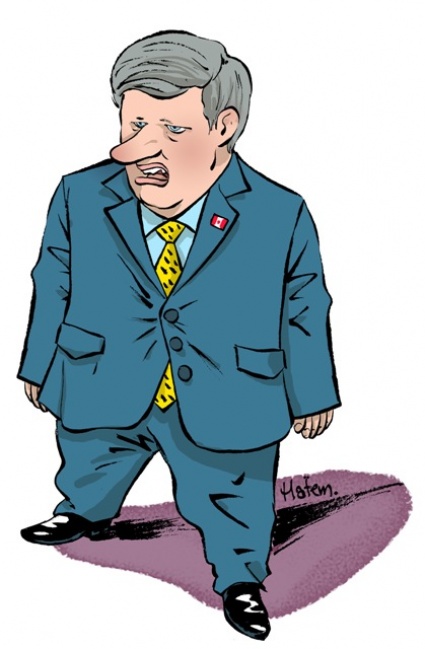May 26, 2015
Harper is a bigot; he doesn't like Muslims - lawyer says

At a news conference on May 7, 2015, after Omar Khadr was released on bail, his lawyer, Dennis Edney, told the media "Mr. Harper is a bigot; he doesn't like Muslims."
While the statement was offensive to some, Mr. Harper has a rather lengthy record of questionable treatment of Muslims.
As a result of a firefight on July 27, 2002 in the village of Ayub Kheyl, Afghanistan, Mr. Khadr – a Canadian citizen - was convicted of war crimes by a United States military tribunal in Guantanamo, Cuba, following a controversial process.
Mr. Khadr was the first person since World War II to be prosecuted in a military commission for war crimes committed while still a minor – he was 15 years old.
Canada was the only western country in the world that didn't request the repatriation of its citizens from Guantanamo Bay, despite the urgings of Amnesty International, UNICEF, the Canadian Bar Association, The Federal Court and other prominent organizations.
In April 2010, the Canadian Conference of Catholic Bishops criticized Canada for failing to uphold the law and repatriate Mr. Khadr, noting that "ideological indoctrination" seemed to have distorted public feelings about the case.
On May 8, 2015, Canada's Prime Minister Stephen Harper remained unapologetic about his government's efforts to keep Omar Khadr imprisoned.
A number of critics – Mr. Edney among them – claim that Stephen Harper’s stance on Omar Khadr has nothing to do with the merits of the case or U.S. /Canada relations and everything to do with his faux-tough-guy posturing on the world stage.
Canada is a multicultural country with over one million Muslims, most of whom are Canadian citizens. And how has Mr. Harper responded to some of the concerns of this community?
In 2007, the Harper government tried to ban niqabis when Canadian citizens were voting.
That attempt was thwarted by Marc Mayrand, chief electoral officer, who noted that about 70,000 voters, including inmates, mail their ballots without ever being asked to show their faces.
Undeterred, Mr. Harper continued his battle against the niqab.
Despite a Federal Court decision finding the ban on wearing a niqab during citizenship ceremonies unlawful, Mr. Harper remained intransigent, calling the niqab the product of an 'anti-women' culture and saying it’s “offensive” for women to wear the face-covering niqab when taking the oath of citizenship.
In February 2015 he vowed to appeal a court decision overruling the ban on wearing a niqab during citizenship ceremonies. Meanwhile, the Conservative Party is raising funds using its campaign against the niqab.
It's is also telling that in advocating for freedom of religion abroad, the Harper government rarely supports the beleaguered Muslim Uighurs in China, Rohingas in Myanmar, Shiites in Saudi Arabia and Lebanon, or the Sunni majority in Syria, long persecuted by the autocrat Bashar Assad.
In 2011, Mr. Harper spoke of “Islamicism” as the main terrorist threat to Canada. Recently, he followed this up by explicitly linking mosques to terrorism, despite having said exactly the opposite in New York last fall.
After the October 20, 2014 attack in Saint-Jean-sur-Richelieu, Quebec, when Martin Couture-Rouleau attacked and killed two Canadian Armed Forces soldiers and the October 22, 2014 attack on Parliament Hill, by Michael Zehaf-Bibeau, Prime Minister Harper declared that these attacks were the work of Islamic terrorists, although investigators have never been able to uncover any evidence that either perpetrator was connected to any organization.
Linda McQuaig, an award-winning journalist, said: "lots of hype about Canada and our institutions being under attack — even as it got harder to explain the difference between the ‘terrorist’ murders of two soldiers and the ‘non-terrorist’ murders of three RCMP officers in Moncton. The main difference appeared to be that the shooter in Moncton was not a follower of Islam.”
While Canadians are well-aware of Mr. Harper's response to the attacks in Quebec and Ottawa, what is less well-known is his silence in response to an attack on a mosque in Ottawa, the week after the attack on Parliament.
On October 24, 2014, CTV News reported that windows were smashed at the Assunnah Muslims Association mosque in Ottawa.
Mosque president Mohammed Mostefa believes the vandalism was "probably" in response to the hit-and-run murder of a soldier in Quebec and the killing of an honour guard at the National War Memorial by a gunman who then stormed the Parliament buildings.
"We are trying to work together with our law enforcement and our authorities to end this what is called radicalization of youth. We are trying to do our utmost to help," Mr. Mostefa said.
But when political leaders denounce Muslim extremists but don't come to the defence of moderate Muslims, Mr. Mostefa said young Muslims will think: "This is my country and you don't come to my support to stand by my side."
And that sends "the wrong message."
Mr. Mostefa's mosque issued a statement urging all elected officials, from the prime minister to municipal councillors, to denounce acts of hate against Canadian Muslims.
Meanwhile, renowned philosopher Charles Taylor, who co-chaired Quebec’s 2007 commission on reasonable accommodation of cultural and religious minorities, said the stereotyping and stigmatization of Muslims today is “sociologically very, very similar” to that faced by Jews in the past.
“This kind of scapegoating, alas, we see this throughout human history … We’ve got to fight it wherever it comes up, no quarter. This is something we can give not an inch to, not a centimetre to.”
Liberal leader Justin Trudeau warned Canadians to be wary of such tactics the Harper government is using: “Fear is a dangerous thing. Once it is sanctioned by the state, there is no telling where it might lead. It is always a short path to walk from being suspicious of our fellow citizens to taking actions to restrict their liberty.”
Did Mr. Trudeau have a crystal ball?








